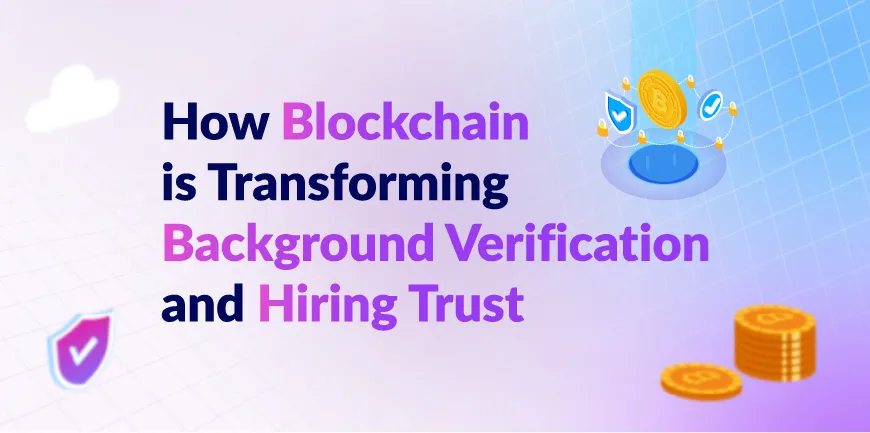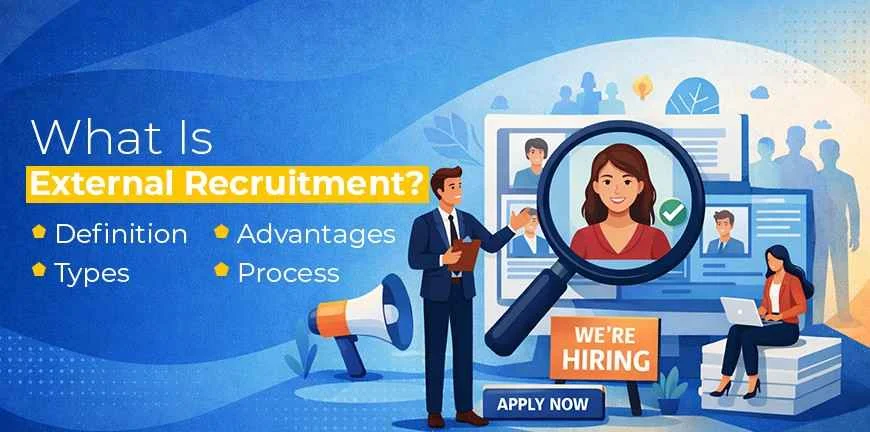
What is Recruitment? Definition, Meaning, and Process [Complete Guide]
19/09/2025
What is the Importance of Executive Search
19/09/2025In a world where competition shows no mercy in the job market, recruiting appropriate talent is an ordeal. Background checks have become overtly critical as there is a significant rise in fraudulent activities.
But imagine a landscape where these checks and verification systems are simplified and at the same time safe.
Employers today are cautious about selecting the right candidates, as portfolios and CVs are just not enough. They focus on screening credentials and reputation using modern methods.
Breaking the barriers of conventional verification systems, a powerful force called blockchain technology emerges, an innovation slated to transform verifications and accelerate trust in recruitment.
According to survey reports, organizations implementing blockchain for background verification have reported a 97% reduction in fraudulent credential attempts.
Challenges of Conventional Background Verification
Before we dive into the world of blockchain and how it impacts the job market, let us talk about the traditional hurdles:
1. Fabricated Credentials
Several studies indicate that many CVs are full of fake or exaggerated descriptions of education, past employment records, or certifications. It is harrowing to manually verify the documents, and it can result in errors.
2. Time-Taking Procedures
Old background check methods often involve too many stakeholders. Each has its own verification techniques. For instance, a university will have a different process than that of government firms. These organizations usually take the assistance of third parties and rusty methods, which are time-consuming. The recruiters keep waiting with uncertainty.
3. Lack of Transparency
The old methods of background checks usually happen behind closed doors. Once candidates submit their resumes, they are kept in the dark as various agencies and institutions verify the documents. Employers also wait for the response of third-party agencies. There is a lot of uncertainty and fear of limited transparency.
4. Data Protection Risks
A candidate profile, after submission, is passed through various hands. The resume and documents are sensitive as they carry personal information, past employment records, etc. The fear of misusing critical information remains a challenge. There are too many institutions, bodies, and agencies that can access the information.
Blockchain, the Problem-Solving Force
Blockchain, the decentralized ledger technology, makes open transactions safe and smooth through a computer network system, bringing a host of benefits that directly address the obstacles:
1. Indelible Credential Record
Blockchain ensures authenticity, and once the documents or qualifications of a candidate are added, they cannot be tampered with or altered in any way. Once the data enters the blockchain, it cannot be manipulated. Employers can now stop verifying the same document from multiple sources.
2. Expedited Verification Process
With the introduction of blockchain, employers can directly go to the platform and check credentials without wasting any time. When it comes to blockchain, documents are already validated in source and then stored safely. Employers can directly check the record and confirm authenticity.
3. Improved Visibility and Dependability
Blockchain serves as a single point of contact for all the parties, including employers nd candidates. There is transparency as documents can now be stored in a ledger that can be accessed by recruiters and applicants. There is no hassle of coordinating with multiple institutions and agencies. This enhances hiring decisions and establishes trust.
4. Strengthened Privacy and Safeguard Measures
A system called encrypted data sharing is present in blockchain, where candidates can control who accesses the information. When sensitive data is stored in multiple locations, it increases the risk of breaches. For employers, it is beneficial as they can access authentic and verified data without worrying about the risk of ruining data privacy.
5. Cost-Efficient Method
As the traditional methods usually involve the intervention of various intermediaries and agencies, there is an added cost of verification fees, agency fees, and other administrative expenses. The Blockchain system alleviates expenses significantly, and employers can get direct access without having to hire agencies or rely on any external party, saving on costs.
Real-World Examples
A few companies leveraging blockchain Technology are:
- Tech Mahindra- The enterprise builds blockchain platforms/solutions like smart contracts, supply chain traceability, etc..
- Wipro- The tech giant provides blockchain consulting, identity management, supply chain optimization, etc.
- Bajaj (Finserv / Electricals)- They utilize blockchain for insurance claim processes (Finserv) and reducing costs/process inefficiencies, like bill discounting in the Electricals arm.
Future of Blockchain in Recruitment
The rise of AI automation and other advanced digital platforms is driving recruitment to evolve in an unthinkable way.
Blockchain is set to be the key enabler in this revolution as it can transform and resolve stubborn inefficiencies that impact data privacy, verification, and transparency.
Although blockchain integration in recruitment is still at its nascent stage, the prospects are huge. Here are some of the reasons:
1. Unalterable Candidate Profiles
Verified credentials like work record, documents, certificates, skill evaluations, etc, can be stored safely in a blockchain.
It is easier for recruiters to access data from a central point instead of investing time in verifying documents by chasing a number of agencies.
This process is not just time-saving but also diminishes the risks of fraudulent activities. It is a smooth and effective way that can expedite hiring.
2. Distributed Workforce Networks
The future of recruitment is promising for candidates with blockchain, as they will not be pushed to make several profiles for several job platforms.
They can now create a singular, safe, and secure profile that will have a blockchain-powered digital identity.
They can maintain one profile entailing their verified documents, assessment credentials, work history, etc. They can also be the deciding factor in who can access their information and how far.
3. Cost-Efficient and Swifter Background Checks
Blockchain technology helps in cutting down costs as recruiters do not have to hire agencies to verify credentials.
There is a shared digital ledger where institutions, past employers, government agencies, etc, can share authentic data or records directly on blockchain.
It is faster and easier for both candidates and recruiters, as recruitment cycles are smooth and the accuracy of information is ensured.
4. Digital Work Contracts
The concept of smart contracts was introduced by blockchain technology. These contracts are essentially digital documents or agreements that can speed up processes.
For example, when a candidate accepts a job offer, a smart contract can be instantly programmed and can generate offer letters, onboarding documents, and automatically initiate salaries and bonuses.
5. Enhanced Candidate Experience
Candidates can now breathe a sigh of relief with blockchain, as they do not have to repeat the process of uploading the same documents on multiple job platforms.
Their verified documents will be under their ownership, with blockchain making an entry, providing them a sense of security and privacy. This will also develop trust between candidates and employers.
6. Fair Recruitment Practices
Recruitment processes today sometimes get influenced by unwanted biases. Blockchain can eliminate these biases by facilitating hiring processes, where in the initial screening stages, a candidate’s profile is kept hidden.
Personal details are kept anonymous while professional identifiers like work history, CV, certificates, etc, are visible. This merit and skills-based approach is more inclusive, providing equal scope to all candidates.
7. Global Hiring Made Easy
Businesses today are not bound by geographic limitations. There is an exponential rise in cross-border hiring with remote and hybrid work models taking centre stage.
One of the most significant challenges in this kind of recruitment is the verification procedures, as every country has its own system.
However, with blockchain, the complexities can be reduced by creating a common digital platform where records can be published by any university, professional, or government bodies from across the globe.
8. Blending AI and Blockchain
With AI taking the world by storm, the convergence of AI and blockchain-authenticated profiles can accelerate the way recruiters can identify and hire.
AI can easily assess huge volumes of data in very little time to spot suitable candidates for various roles.
However, the accuracy of data can be a challenge. This is where blockchain steps in with its verified, untampered, stored data that AI algorithms can work with.
According to a report by IMARC Group, the Indian blockchain market is expected to reach 61,532 million by 2033 (CAGR ~65.6%)
According to the Deloitte Global Blockchain Survey, a few years back, more than 39% of companies worldwide now have blockchain in production.
Blockchain is not just a passing trend but is a force field that enables reforming the way enterprises verify talent and build trust in recruitment. Blockchain blends transparency, safety, and authenticity in hiring, enlightening both candidates and employers.
With more companies adopting the approach, there will be a significant reduction in inefficiencies, and fraud risks can be averted easily. The approach will also make recruitment intelligent, smart, and reliable.
Organizations can carve a niche and set examples by adopting blockchain, as it will become the hallmark of excellence in smart hiring.
Contact Us For Business Enquiry

Amit Saproo
Amit Saproo is the Head of Operations at ALP Consulting with nearly 17 years of experience in Executive Search, RPO, Leadership, and IT & Engineering recruitment. He leads nationwide recruitment programs across Technology, BFSI, and R&D domains, driving strategic hiring solutions for diverse client needs. Amit excels in building and managing high-performance teams that deliver scalable, end-to-end recruitment and consulting services.



